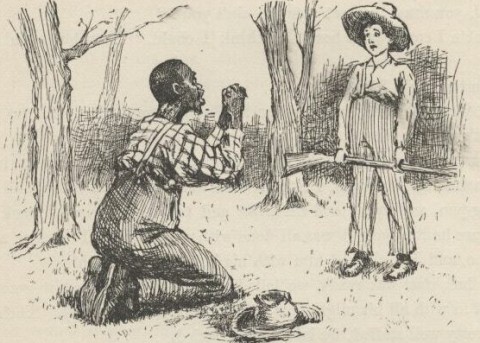A brilliant and offensive book

My generation--the tail-end
of X, or early Millennials--grew up in a time of soft racism and racial
inequality; we were also brought up to be tolerant and "color blind." Like most of
my peers, I wouldn't be caught dead using the n-word (despite being a bit of a
profanity connoisseur). I was taught that it's the most abhorrent of
epithets--although I also grew up exposed to hip-hop artists and comedians who
use the word with what seems like impunity.
The n-word issue has come up
recently with the decision by NewSouth Books to release a new edition of Adventures of Huckleberry Finn. The 1884
Mark Twain novel has a long history of controversy and censorship, much of it
involving its record 219 uses of the despised word. This new edition does away
with the n-word word entirely: hoping to reach a broader audience and stave off
controversy, the editors replaced it
each time with the word "slave."
Everyone seems to have an opinion about this. Many think the new edition whitewashes the past. But editor Alan
Gribben spoke compellingly to Publishers
Weekly about his
decision. Doing Huck Finn readings across Mississippi in 2009, Gribben encountered
numerous teachers and other readers who lamented the barrier the n-word creates
to teaching and enjoying this wonderful American novel.
Twain prefaces the book with
a note about its many dialects, lest readers "suppose that all these characters
were trying to talk alike and not succeeding." The n-word appears often because it was natural for a wide variety
of white characters to use it; by writing in all these different voices, Twain
demonstrates how pervasive dehumanizing language about African Americans was in
the pre-Civil War South. Huck's own use of the word only makes his journey--up
the river, into adolescence, toward freedom and understanding--more momentous
and compelling.
But Huck's voice is not
Twain's--and not everybody gets this. I know teachers who echo Gribben's
concerns. Whenever my sister, who's taught at several high schools with mostly
nonwhite students, assigns a book focused on race issues (whether it's Twain or
Sherman Alexie), she struggles with the fact that teenagers aren't used to
distinguishing between narrators and authors. She's been called "racist" more
than once. She cries each time.
Preachers know the difficulty
of using texts with violent imagery or troubling language. I was reading the
story of Jael's assassination of Sisera in church recently, and my eyes went immediately to
the nine-year-old in the second pew. I edit Martin Luther King Jr.'s writings
when I read them in worship--despite the feelings of foreboding and hubris this
creates--because I can't bring myself to say the word "negro" from the pulpit
and risk validating it for others.
The current book-club staple The Help tells of African-American women
who work as domestics in the 1960s. In her review of the book, Sandhya Jha notes that though it's intended to be
uplifting and mildly subversive and includes little offensive language, The Help still rubs many people the wrong
way.
Twain wrote a brilliant novel
that manages to be satire and epic and coming-of-age story all at once--and
that uses the n-word 219 times. Michael Chabon highlights
how painful and complicated it is to navigate the book; his essay challenges
all parents to engage their children in conversation.
I wish these discussions were
taking place in classrooms and churches. I wish it were easier for Christians
to talk about satire and truth, our troubling histories and human brokenness,
our enduring need for grace to change us. I wish we could read the Bible with
the critical voracity--with passion and deep inquiry, the awareness of what is
hurtful and what is transcendent--that some have brought to the debate over Huck Finn.




